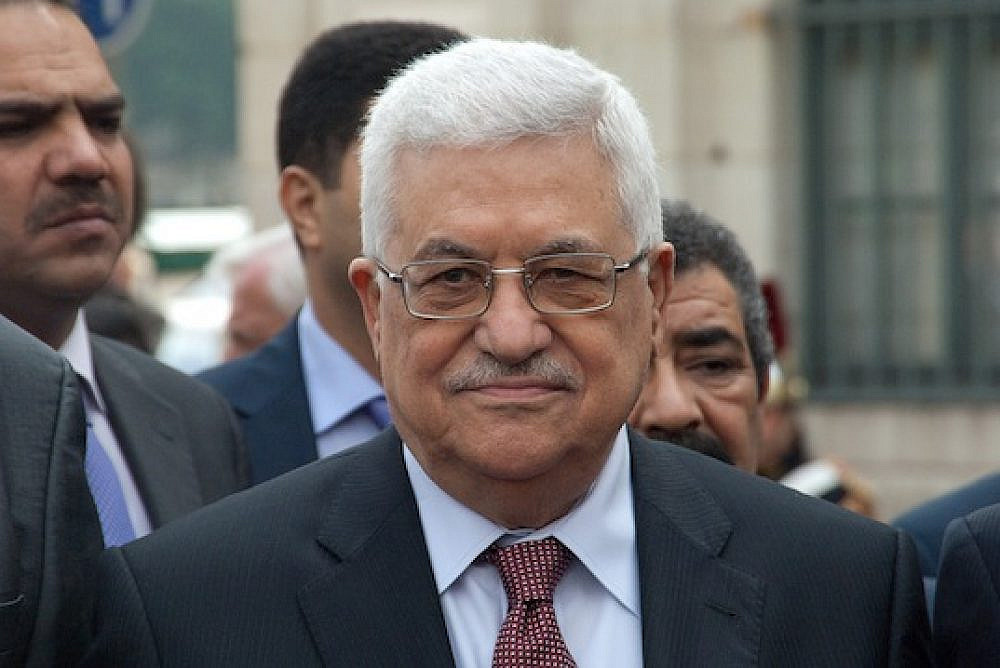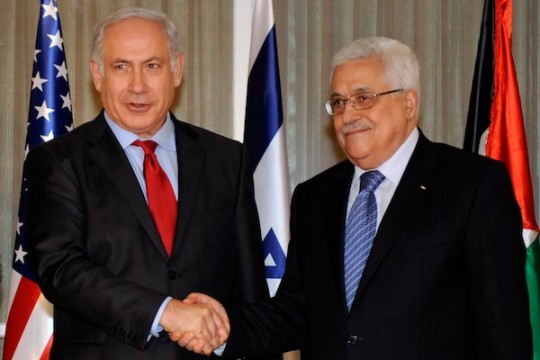Many hopes were pinned on Mahmoud Abbas after he succeeded Yasser Arafat in 2004.
For the international community, Abbas was the polar opposite of his predecessor. From 2000 and until his death, international leaders had grown tired of Arafat, while Abbas still earns their praise. And Western leaders had good reasons: unlike Arafat, Abbas is not theatrical; they could always count on his word. He was one of the architects of the Oslo Accords, and openly opposed the violence and terrorism of the Second Intifada, which to his mind was catastrophic for the Palestinians.
In 2003 Western leaders and Egypt forced Arafat to appoint Abbas prime minister, while transferring over some of the famed leader’s authority to his future successor. The conflict between Abbas and Arafat led to an increased appreciation for the former, whom the world viewed as an ideal leader. It was hoped that through his leadership the Palestinians will undergo the same change that Abbas himself underwent. The man who began as a supporter of armed struggle and the establishment of a Palestinian state to replace Israel has, since the 1980s, supported negotiations and a small Palestinian state alongside Israel. The Israeli peace camp was sure that the public that elected Abbas president would stand behind him when it came time to make peace with Israel.
Abbas won the support of both the Palestinian people and the Palestinian establishment. He is the last founding father of Fatah still around today. Abu Eyad and Abu Jihad, who were his superiors, were both killed, while Farouk Kaddoumi rejected Oslo and became irrelevant. Marwan Barghouti became more popular and militant than Abbas, but he challenged the old guard and never won international support. Furthermore, Israel was never interested in releasing him from prison. Abbas was, and remains, a more convenient rival.
The subcontractor
But it wasn’t only his age and veteran status that worked in Abbas’ favor. Thanks to international support he is viewed as the only person who can force Israel to end the occupation and win independence for his people. Many in the West Bank and Gaza believed that Abbas was willing to go too far and give up the right of return for 1948 refugees into Israel. But the hope that Abbas would gain freedom from the occupation lessened the worry among Palestinians that he would give up on the dream of return.
Abbas himself believed that his moderate positions would pay off. The United States, along with Western Europe, pressed Israel to agree to a peace agreement according to the principles outlined in the 2002 Arab Peace Initiative. He surely did not imagine that he would still be asking permission from the Israeli army to exit and enter Ramallah at his age.
Today Abbas looks around and sees how the settlements are expanding on the ruins of the Oslo Accords, and he is simply unable to stop it. Israel is working hard to prevent the establishment of a sustainable Palestinian state with territorial contiguity, while deepening the cantonization of the West Bank that resulted from the Oslo Accords.
The comparison to Arafat’s greatest successes is not exactly flattering to Abbas. The legitimate criticism of Arafat’s strategic concessions during Oslo could not overshadow the success he brought to the national movement. Arafat pushed Fatah and the PLO from the political margins of the Arab world to the spotlight, and through Oslo was able to connect the Palestinian leadership to both the land and the public.

Abbas, on the other hand, cannot seem to move forward. On the contrary, under his presidency, the Palestinians have only regressed. After more than a decade under his rule, the Palestinians are further away from independence, and living with less democracy than under Arafat. Under Arafat, the Palestinian Authority built democratic institutions. Not much, if anything at all, has been left over from them. The Palestinian Legislative Council (the Palestinian parliament) does not meet, the last elections to parliament and the presidency — which were set for 2009 — never took place, and do not seem to be anywhere on the horizon. Although he is already past 80, Abbas stubbornly refuses to appoint a successor, and while he does appoint governments, there is not parliament to either back them vote them out of office, as Arafat experienced in 2002.
Lacking a legislative branch, Abbas has become a legislator by executive orders. The judicial branch is weak, and the strong arm of the PA security services comes down hard on opponents of the regime. Churchill said: “Democracy means that if the doorbell rings in the early hours, it is likely to be the milkman.” In the Palestinian Authority, it is the security services. Front doors will be broken down at 2 a.m., which means the Israeli army has arrived. This often happens through security coordination with Israel. Intelligence received by the Palestinian side is transferred over to Israel. Politically speaking, Abbas prefers that Israel take care of detentions and interrogations.
Security coordination has turned Abbas into Israel’s subcontractor. Israel remunerates him by taking care of Hamas — his political rival that won a majority in the 2006 parliamentary elections — in the West Bank. It “pays” him through the expansion of settlements and its lack of willingness to reach a permanent agreement with which Abbas can live. Abbas never had great expectations of Israel; he had hoped the United States would foot the bill by putting pressure on the government in Jerusalem. The U.S. trained and funded the Palestinian security forces and permitted the Palestinian side to make good on its side of the deal, but the political assistance from Washington never came. The sympathy Abbas enjoys in the West is more pity than empowerment.
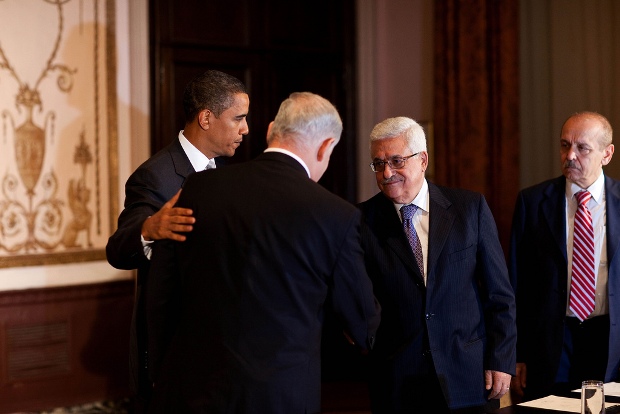
Abbas is looking around him and sees a war-torn, bleeding Syria. Lebanon and Jordan are buckling under the weight of hundreds of thousands of refugees, wary of potential radical Islamist groups. The military regime in Egypt is busy dealing with the Muslim Brotherhood, which they kicked out of power, as well as the Islamist guerrillas in Sinai. The West Bank, which Abbas rules alongside Israel, remains quiet. But this is only due to the efficiency of the Israeli occupation and its collaborators. Security coordination — a stipulation for independence laid out in the Oslo Accords — has become a necessary condition for maintaining Abbas’ rule and repressing the Islamist opposition. Abbas, who in his past was neither a strong man nor the head of a security service, maintains his presidency through force.
Three Israeli prime ministers
Abbas comes from political margins of the PLO. Although he was one of the founders of Fatah in 1959, he remained in his position in the education and culture ministry in Qatar, while Arafat and his comrades garnered support in the refugee camps. Abbas came to Qatar in 1957 from Damascus, to which his family fled from Safed in 1948.
In 1970 Abbas decided to dedicated most of his time to political work in Fatah and the PLO. Arafat and Kaddoumi were at center stage, while Khaled al-Hasan published political works and Mahmoud Darwish wrote the Palestinian experience into poetry. Abbas remained on the sidelines for many years, where the Oslo talks began. Once they broke into the mainstream, Abbas found himself in the spotlight.
But he was once again relegated to the margins. His Israeli counterpart, Shimon Peres, won the Nobel Peace Prize along with Yitzhak Rabin and Arafat, while Abbas never received credit for the deal. Between 94-95, he continued to remain on the sidelines. Abbas then came to an agreement with Yossi Beilin, who worked under Peres in the Foreign Ministry, on principles for a long-term peace deal. Rabin’s murder drove a stake through those plans. Peres rejected both the plan and the very idea of making the principles a central component of his campaign to succeed Rabin.
Until Oslo, Abbas only knew Israelis from far away. Since then he has met with them and has won the support of the Israeli Left, which, to his chagrin, is not in power. The Israelis he agrees with are essentially powerless, while he disagrees with those who do hold power. The last last three prime ministers have been very different from Abbas both in their personality and their political positions. They have been dominant, charismatic, and manipulative. They are driven by political struggles. Abbas, on the other hand, is drab — lacking all charisma or charm. His approach is all business, and he avoids confrontation.
Sharon insisted on unilaterally evacuating settlements from Gaza in 2005 without any coordination with Abbas or any achievements to the latter’s name. Hamas exploited this during their 2006 election campaign, claiming that one year of armed struggle achieved more than Abbas could in all his years of negotiations.
It is true that Abbas and Olmert came to an understanding after the latter strayed from his rightist origins. But Olmert began his journey too late. Without any political support from then Foreign Minister Tzipi Livni or Defense Minister Ehud Barak — and on the verge of being removed — he was simply unable to bridge the fundamental gaps with Abbas. Meanwhile, talks with Netanyahu were empty and were defined by their deep mistrust. Abbas entered them in the hopes of winning the hearts of the American envoys who zig-zagged between the two leaders.
Cultural disconnect
Abbas’ attempts at speaking to the Americans and the Europeans was the default. Until the end of the 1980s, he depended on the Soviet Union. In 1982 he received a doctorate degree from the University of Moscow for a dissertation on Zionism. Until moving to Tunis that same year, he lived in Damascus rather than Beirut — where the PLO was headquartered.
His turn to the West came only after the collapse of the Soviet bloc, knowing full well that if the Palestinians wanted parity with Israel, they would have to start relying on political pressure. The change in direction didn’t turn Abbas into a Western liberal nor a social democrat. If he adopted Western tendencies, they were the capitalistic ones he took on in Qatar — and without any of the theory that stood behind them. Questions of economy and society are not his top priority. Abbas does not dialogue with intellectuals and is not interested in political theory, literature, or history.
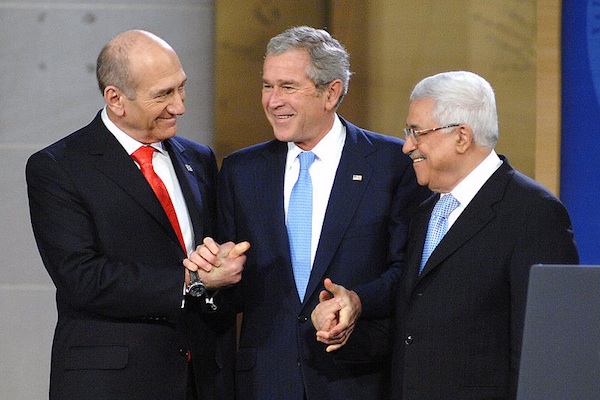
Abbas competes with Israeli leaders over the heart of the Americans at a disadvantage. His interests and cultural background are entirely different from those that a Western audience needs or appreciates. Furthermore his position in Washington’s corridors of power is inferior to that of Israel. George W. Bush and Condoleezza Rice personally liked Sharon and Olmert. The cold relationship between Obama and Netanyahu, and the sharp differences in their personalities, did not translate to close relations between Abbas and the liberal president.
Indeed, Abbas gave up on the romantic nationalism he so believed in during the 60s and 70s, coming to realize that armed struggle only harms Palestinian interests. Political pressure on Israel is the only hope Abbas has to gain independence, but he does not have the tools nor the ability to push the West to do so. As a result of pressure by Secretary of State John Kerry, Abbas relaxed the conditions for entering negotiations with Israel, for example on issues such as a settlement freeze and prisoners’ release. His main objective was to gain U.S. support for parameters for a final settlement.
But in this he was disappointed. The document formulated by Kerry in the spring of 2014 was a far cry from what Abbas had hoped for. Following the failure of the talks, the U.S. withdrew from mediating between him and Netanyahu. After all, America has other, more pressing issues to attend to. Abbas was left bitter and frustrated.
Abbas’ only real accomplishment took place in 2012 when, despite U.S. opposition, the UN General Assembly upgraded the status of the PLO to a non-member observer state. Last December Abbas tried to go one step further and bring the UN Security Council to support Palestine as a full member state of the UN. He rejected a more moderate proposal by France, but the U.S. prevented the more hardline Palestinian proposal, which was submitted by Jordan. France was humiliated and is no longer willing to submit proposals that would be rejected by the Americans. The other European countries are busy with more pressing matters: illegal immigration and refugees; growing Muslim radicalism; the war on ISIS; the Ukraine crisis; and the future of the Eurozone.
No partner, no umbrella
As a last resort Abbas is asking parliaments in western Europe for virtual recognition of a Palestinian state. Twelve parliaments acquiesced, mainly as a protest against Netanyahu’s policies. But only one Western government, that of Sweden, recognized the Palestinian Authority as a state. Concurrently, Abbas appealed to the ICC, accusing Israel of war crimes. These tactics will not bring about Palestinian independence; they will only keep alive the desire for independence, which will be realized by the next leader.
Since the Palestinian Authority does not have the leverage of a state, Abbas could use Arab interstate political cooperation — at least as long as it was functioning — to push the West to pressure Israel. Moreover, the PA is entirely financially and politically dependent on other countries and international organizations. In addition, Abbas needed the backing of Arab leaders to stand up to internal criticism by Hamas, while the parliament elected in 2006 was paralyzed, and there was no elected body to legitimize his moves. His chief supporter was President Mubarak, who had excellent ties with the U.S. and Israel.
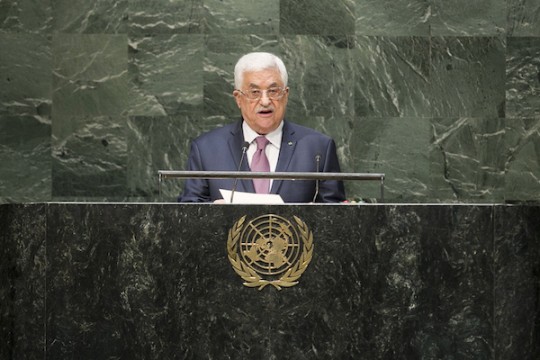
Mubarak’s downfall and the immobilized Arab League left Abbas without a political umbrella. He cooperates on specific issues with President Al-Sisi against Hamas in the Gaza Strip, and with King Abdullah in Jordan in order to help him block the national-religious right in Israel, which is working to change the prayer arrangements on the Temple Mount/Haram al-Sharif. As opposed to Arafat, who dislodged Jordan from management of the site — and rendered meaningless the clause in the peace agreement between Israel and Jordan, which gave the latter preferred status over the holy places in the city — Abbas was forced to agree that Jordan be the new guardian of the holy sites in Jerusalem. In exchange, Jordan recognized Palestinian sovereignty over East Jerusalem, if and when it comes to pass.
Mahmoud Abbas was unable to mobilize Israeli society to put pressure on various right-wing governments. Since winning the presidency, he has directly addressed Israelis and has said the right things. And yet Israeli society has responded with skepticism and by electing right-wing and centrist governments. Abbas’ image in Israel’s political system is more a reflection of that system than Abbas himself. The Israeli Right views Abbas as a wolf in sheep’s clothing, while the center views him as feeble and unable to subdue the radicals in his camp. His soft style has led the Zionist Left to the conclusion that Abbas will give up on the right of return for Palestinian refugees. In short, the political system in Israel looks at Abbas and sees itself.
In the second part of this series, which will be published next week, I will review Abbas’ status within Palestinian society, as well as the challenges from his political rivals within the PLO and outside it.
This article was first published in Hebrew on Local Call. Read it here.

